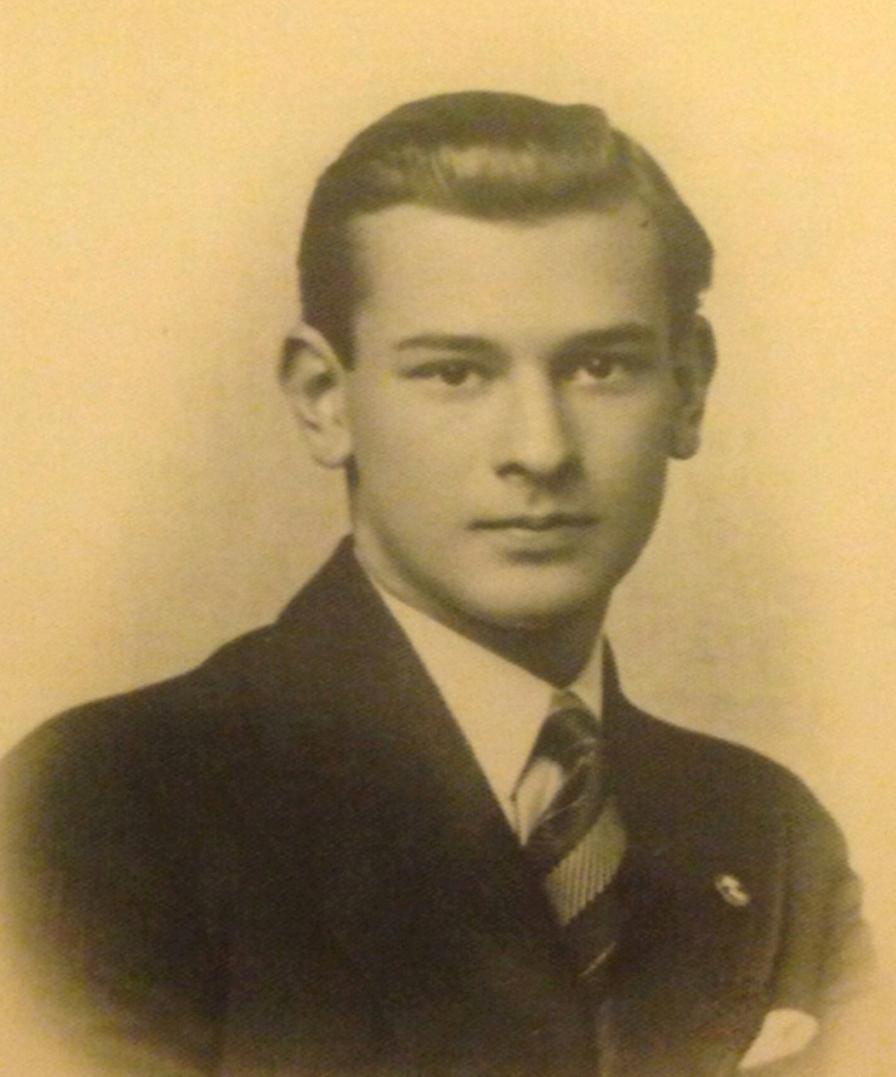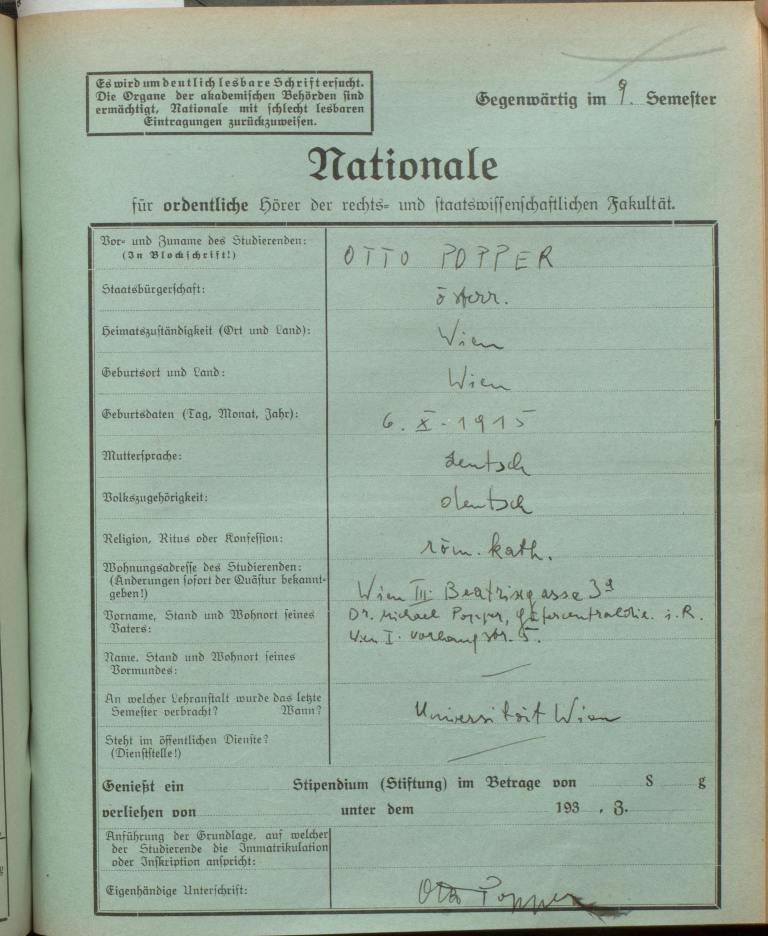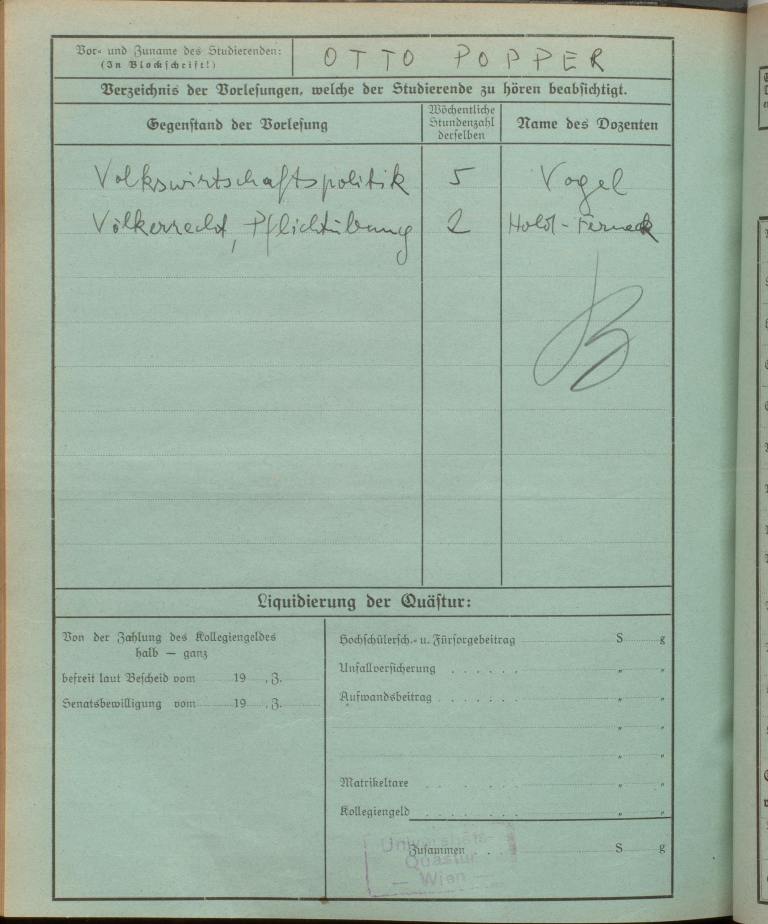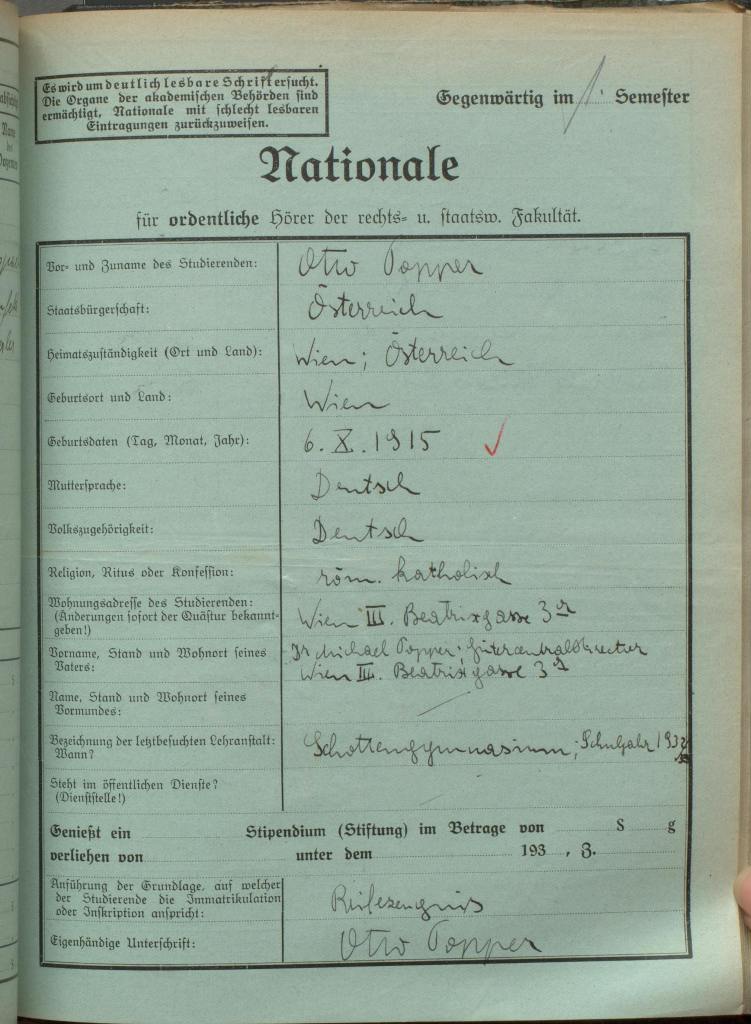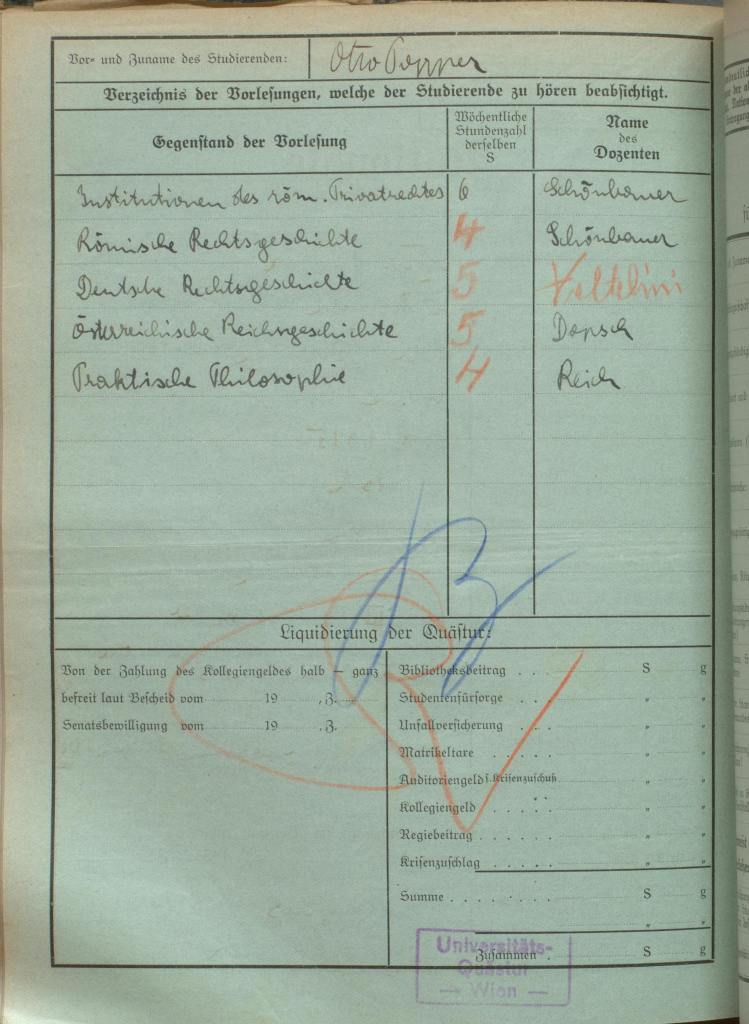Otto Michael Popper
| Born: |
10-06-1915 |
| Faculty: |
Law School |
| Category: |
Expelled student |
Otto (Michael) POPPER, born on October 6th, 1915 in Vienna/Austria (entitled residency ('heimatberechtigt') for Vienna, Citizenship: Austria), son of Dr. Michael (Ottokar) Popper (1859-1942, until his retirement central manager of the estate of Clam-Gallas) and his wife Maria, nee Lintschnik (Lientschnik) (1889-1988). He lived with his mother in Vienna 3rd district, Beatrixgasse 3a/19. His father was registered in the family’s second residence in Vienna 1st district, Vorlaufstrasse 5/7. His parents married on July 8th, 1922.
After Otto Popper had graduated from high school ('Schottengymnasium') in Vienna 1st district, he began to study law at the University of Vienna in fall term 1933/34. He was finally enrolled in fall term 1937/38 at the Law School in the 5th year of his studies ('Absolutorium' was certified on January 31st, 1938). He passed his three final examinations in February 1938 (Law), in July 1938 (Political Sciences) and in December 1938 (Law History). On December 12th, 1938 he was able to graduate at the Law School of the University of Vienna on December 12th, 1938 with the academic degree 'Dr. iur.'.
Under National Socialist racial laws, his father Michael Popper, who had converted to Catholicism in 1888, was categorized as a "Jew", his mother Maria Popper as an "Aryan". Therefore, Otto Popper himself – also baptized Roman Catholic –was considered a "Mischling 1. Grades" ("half-Jew") according to the Nazi race doctrine.
He was deregistered from his address in Vienna 3rd district, Beatrixgasse 3a/19 on May 20th, 1940 and fled from persecution by the Nazis to Milan/Italy. There he finally resided in Largo Augusto, before he returned to Vienna for a week in October 1941 and temporarily lived with his mother again (In 1941 his parents sold parts of their ethnographic collection to the Museum of Ethnology ('Museum fuer Voelkerkunde') in Vienna, which had already received some of the objects from South America as a loan in the 1930s). He travelled to Vienna again from June 30th until July 8th, 1942 – two months after his father had died on April 22nd, 1942 –, and returned back to Milan afterwards.
In 1943 Otto Popper was arrested and sent to San Vittore – a prison in Milan under German administration – like several other antifascists. He had become a father of two sons, the younger one was born after his arrestment and he never saw him. Their mother Ariane Dufaux fled with them to Geneva/Switzerland, where they survived the war.During his seven-month imprisonment in San Vittore Otto Popper was used as a translator. In this position he was able to significantly support the resistance movement in the prison by maintaining by the exchange of information both among the political prisoners and the outside world. He received numerous hidden food packages from friends in freedom, which he distributed among the prisoners, and encouraged the other inmates.Later Popper was transfered to the police transit camp Fossoli near Carpi in Modena, which was passed under the control of the SS in the beginning of March 1944. In summer the camp was evacuated in view of the impending arrival of the fighting on the front-line. The entire facility including all remaining prisoners and guards was transferred to the north to the newly established transit camp in Bolzano/Gries.
On August 5th, 1944 Otto Popper left Bolzano in the first large transport, arriving the concentration camp Mauthausen on August 7th. Like Otto Popper most of the other 307 prisoners on the transport were categorized as Italian"Schutzhaeftlinge", most of them came from transit camp Fossoli. In the arrivals list he was registered as a "translator" ("Dolmetscher") and received the prisoner's number 82482.
In Mauthausen all prisoners of the transport initially had to stay at the quarantine block, where Popper met again Enea Fergnani (born on December 24th, 1896 in Dento) who also came San Vittore via Fossoli and Bolzano to Mauthausen.
In early September Otto Popper was transported to the satellite camp of the KZ Mauthausen "Linz III", located in the district of Kleinmuenchen in Linz/Upper Austria. There he became assistant clerk („Hilfsschreiber“) in Block 10 and had to provide the lists of sick prisoners, for work details and for transfers to other barracks or camps. This function gave him certain advantages for the survival in a concentration camp, e.g. a separate sleeping space and additional food rations, but he also was able to help other (esp. Italian) prisoners by organizing their allocation in "better" work commando and giving them food. About two weeks later Fergnani was also transported to Linz, with whom he held contact every day.
In Linz Popper's health deteriorated rapidly. On October 18th, 1944 he first told his fellow prisoner Fergnani about knee pain caused byan edema that spread over the lower leg, and a beginning nephritis - the day after he was transferred to the infirmary. On October 24th, he also suffered from a pneumonia and his friends visited to him bid farewell to him. He died the day after on October 25th, 1944 at the infirmary.
His friend Enea Fergnani noted in his book:
„Ora sono solo. L'ultimo degli amici il piú nobile il piú generoso, quello che tutto chiedeva' per gli altri' e nulla per sé, che spartiva ogni giorno il suo pane e la sua zuppa, che illuminava con la sua infinita bontà le tenebre di questo campo, si è spento. Da San Vittore a Fossoli e. da Bolzano a Mauthausen, egli era salito fino al vertice del sacrificio e della bontà. Piú di noi tutti, suoi compagni di carcere e di deportazione egli era meritevole di salire ancora piú in alto e vi è salito. Domani sarà buttato, nudo, con un numero appeso al piede, nella carretta dei morti, sarà portato lassú per esserví distrutto, perché nulla piú resti di lui. Ma le fiamme non potranno distruggere il suo spirito, che è salito ben piú in alto del colle di Mauthausen e che rimarrà vivo e splendente a guidarci nel cammino che ci resta ancora da compiere.” (FERGNANI 1945, 289)
On May 26th, 1945 the Italian newspaper „Azione del popolo“ published an article by a fellow inmate from San Vittore, A. Dello Siesto, who called Otto Popper because of his selfless assistance to the other prisoners as "Angel of San Vittore".
Only on December 7th, 1950 the Regional Court for Civil Matters ("Landesgericht für Zivilrechtssachen") in Vienna, dept. 48, decided that Otto Popper's death was proved. His mother had claimed the declaration of death in order to receive pension entitlements.
As a part of the project "A Letter to the Stars" Oliver Kratz from Vienna laid down "flowers of remembering" at the last address of Otto Michael Popper in May 2006.
As a result of provenance research at the Museum of Ethnology (Dr. Gabriele Anderl) the Austrian Restitution Advisory Board (‘Kunstrueckgabebeirat') decided in 2007 to restitute the pre-Columbian ceramics bought in 1941 from the parent’s collection. In 2008 the objects were returned to one of Otto Popper's sons.
Lit.: POSCH/INGRISCH/DRESSEL 2008, 451; information from his son Michele Popper, Italy, 2014; Vienna University Archive, Law School: Nationale 1933-1938; registry first state examinations (No. 0254, February 19th, 1938), final examination registry (No. 339) and graduation registry (No. 6595); Mauthausen Memorial Archives, database of prisoners, register of deaths (AMM/Y46, No. 4519), arrivals list from August 8th, 1944 (AMM/Y50/158/02/12/158-163, 162); Vienna City archive, Historical Central Registration of Viennese inhabitants, information 2014, and Landesgericht für Zivilrechtssachen (LZS), A 26, 48 T 1639/50, declaration of death; Austrian State Archive, Archiv der Republik, Vermögensanmeldungen of the parents Michael Ottokar Popper (VA 31193) and Maria Popper (VA 31194); Gabriele ANDERL, Provenienzforschung am Museum für Völkerkunde Wien, in: Archiv für Völkerkunde 59/60 (2009), 23-27; Enea FERGNANI, Un uomo e tre numeri. San Vittore, Fossoli, Mauthausen, Milano 1945; Katharina KNIEFACZ and Herbert POSCH, Otto Michael Popper. In: Andreas Kranebitter (ed.), Memorial Book for the Dead of the Mauthausen Concentration Camp and its Subcamps, published by the Association for Remembrance and Historical Research in Austrian Concentration Camp Memorials, Volume 1: Commentaries and Biographies, Wien: New Academic Press 2016, 329–330; KNIEFACZ/POSCH 2016; BMUK Kulturbericht 2008, 27; Documentation Centre of Austrian Resistance (DÖW): Austrian Victims of the Holocaust; Database "Room of Names: The Deceased of KZ Mauthausen"; Transports from Italy to Mauthausen; Yad Vashem – The Central Database of Shoah Victims' Names; A Letter to the Stars.
Katharina Kniefacz and Herbert Posch
